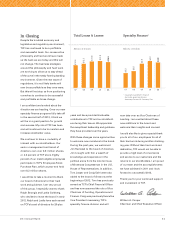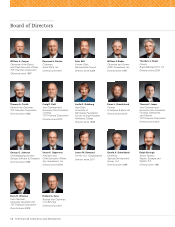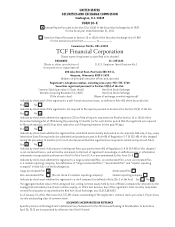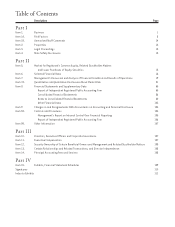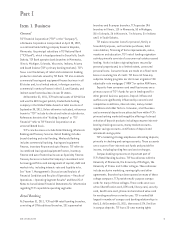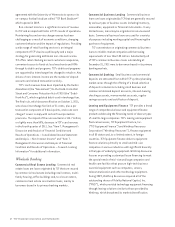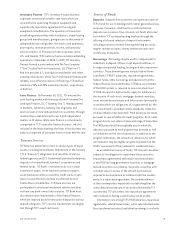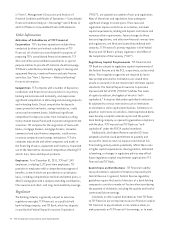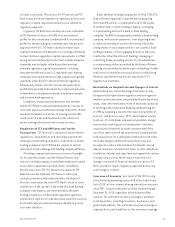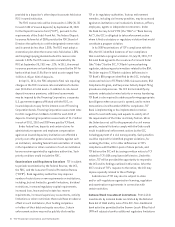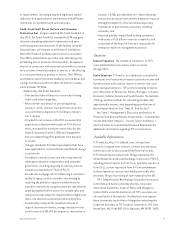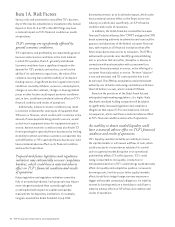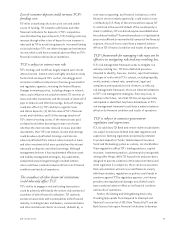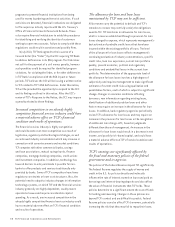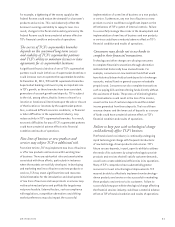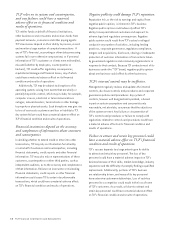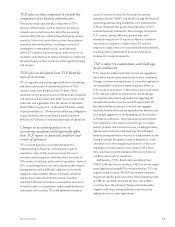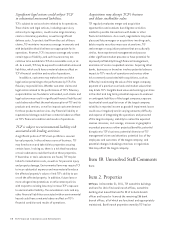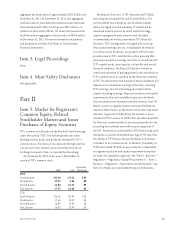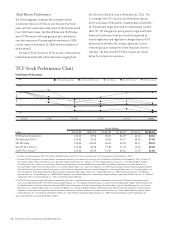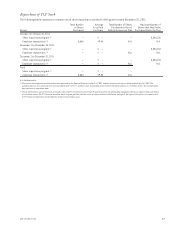TCF Bank 2011 Annual Report Download - page 25
Download and view the complete annual report
Please find page 25 of the 2011 TCF Bank annual report below. You can navigate through the pages in the report by either clicking on the pages listed below, or by using the keyword search tool below to find specific information within the annual report.or requirements, including a required regulatory capital
deduction and application of transactions with affiliates
limitations in connection with such activities.
Dodd-Frank Wall Street Reform and Consumer
Protection Act Congress enacted the Dodd-Frank Act in
July 2010. The Dodd-Frank Act created the CFPB and gave
it broad rulemaking authority to administer and carry
out the purposes and objectives of the federal consumer
financial laws, with respect to all financial institutions
that offer financial products and services to consumers.
The CFPB is authorized to prescribe rules identifying and
prohibiting acts or practices that are unfair, deceptive or
abusive in connection with any transaction with a consumer
for a consumer financial product or service, or the offering
of a consumer financial product or service. The CFPB has
examination and enforcement authority over all banks and
savings institutions with more than $10 billion in assets,
which includes TCF Bank.
Additionally, the Dodd-Frank Act:
• Directed the Federal Reserve to issue rules limiting
debit-card interchange fees;
• After a three-year phase-in period beginning
January 1, 2013, removes trust preferred securities
as a permitted component of a holding company’s
tier 1 capital;
• Provided for an increase in the FDIC assessment for
depository institutions with assets of $10 billion or
more, increased the minimum reserve ratio for the
deposit insurance fund to 1.35% and changed the
basis for determining FDIC premiums from deposits
to assets;
• Changes standards for federal preemption that have
been applicable for national banks and federal savings
associations;
• Provided for new disclosure and other requirements
relating to executive compensation and corporate
governance, including requiring an advisory vote on
executive compensation (“Say on Pay”);
• Provides for mortgage reform addressing a customer’s
ability to repay, restricts variable-rate lending by
requiring the ability to repay to be determined for
variable-rate loans by using the maximum rate that will
apply during the first five years of a variable rate, and
makes more loans subject to requirements for higher cost
loans, new disclosures and certain other restrictions;
• Permanently increased the maximum amount of
deposit insurance for banks, savings institutions and
credit unions to $250,000 per depositor, retroactive to
January 1, 2008, provided that non-interest bearing
transaction accounts have unlimited deposit insurance
through December 31, 2012 and allows depository
institutions to pay interest on business checking
accounts; and
• Required publicly-traded bank holding companies
with assets of $10 billion or more to establish a risk
committee of the Board of Directors responsible for
enterprise-wide risk management practices.
Taxation
Federal Taxation The statute of limitations on TCF’s
consolidated federal income tax return is closed
through 2007.
State Taxation TCF and/or its subsidiaries currently file
tax returns in all states which impose corporate income and
franchise taxes and local tax returns in certain cities and
other taxing jurisdictions. TCF’s primary banking activities
are in the states of Minnesota, Illinois, Michigan, Colorado,
Wisconsin, Indiana, Arizona and South Dakota. The methods
of filing, and the methods for calculating taxable and
apportionable income, vary depending upon the laws of
the taxing jurisdiction. See “Item 1A. Risk Factors”.
See “Item 7. Management’s Discussion and Analysis of
Financial Condition and Results of Operations — Consolidated
Income Statement Analysis — Income Taxes” and Notes 1
and 13 of Notes to Consolidated Financial Statements for
additional information regarding TCF’s income taxes.
Available Information
TCF’s website, http://ir.tcfbank.com, includes free
access to Company news releases, investor presentations,
conference calls to discuss published financial results,
TCF’s Annual Report and periodic filings required by the
United States Securities and Exchange Commission (“SEC”),
including annual reports on Form 10-K, quarterly reports on
Form 10-Q, current reports on Form 8-K and amendments
to those reports as soon as reasonably practicable after
electronic filing or furnishing of such material to the SEC.
TCF’s Compensation/Nominating/Corporate Governance
Committee and Audit Committee charters, Corporate
Governance Guidelines, Codes of Ethics and changes to
Codes of Ethics and information on all TCF’s securities are
also available on this website. Stockholders may request
these documents in print free of charge by contacting the
Corporate Secretary at TCF Financial Corporation, 200 Lake
Street East, Mail Code EX0-03-A, Wayzata, MN 55391-1693.
72011 Form 10-K


